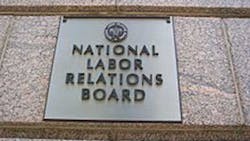Court Strikes Down NLRB Rule on Union-Rights Poster
The U.S. Court of Appeals for the D.C. Circuit on Tuesday struck down a controversial National Labor Relations Board rule that would have required employers to post a notice advising workers of their right to organize a union.
The rule, which applied to most private-sector employers, was published in August 2011. However, its effective date was on hold pending the court’s decision of the appeal.
The rule required employers subject to the National Labor Relations Act to post notices in conspicuous locations informing employees of their rights to organize and bargain collectively. Under the rule, an employer’s failure to post the notice would constitute an unfair labor practice.
The National Association of Manufacturers, which was an appellant on the case before the D.C. Circuit Court of Appeals, called Tuesday’s court ruling “an important victory in the fight against an activist NLRB and its aggressive agenda.”
“The poster rule is a prime example of a government agency that seeks to fundamentally change the way employers and employees communicate. The ultimate result of the NLRB’s intrusion would be to create hostile work environments where none exist,” said National Association of Manufacturers President and CEO Jay Timmons in a prepared statement.
In its decision to vacate the rule, the court said the NLRB’s assertion that non-compliance with the posting rule constituted an unfair labor practice violates the NLRA. The act states that the expressing or disseminating of “any views, argument, or opinion, or the dissemination thereof” cannot constitute an unfair labor practice “if such expression contains no threat of reprisal or force or promise of benefit.”
Wrote Senior Circuit Judge A. Raymond Randolph, who filed the court’s opinion: “The right to disseminate another’s speech necessarily includes the right to decide not to disseminate it.”
The court “has clearly stated the [NLRB] has limited powers,” said Peter Kirsanow, a partner at Benesch law firm and a former NLRB board member. Benesch was the lead counsel for appellants on the case before the appeals court.
The court ruling says the NLRB cannot mandate 6 million employers “speak in a way they otherwise wouldn’t,” continued Kirsanow. The rule “almost required them to be agitators in their own workplace.”
Kirsanow said the ruling has implications in other cases where a federal agency requires employers to communicate specified information, although he notes that the rules among agencies can vary significantly.
Nevertheless, “the rationale could be applied in other cases, with varying degrees of success,” he said.
Tuesday's ruling may not conclusively decide the fate of the NLRB’s posting rule. The board can appeal the decision by petitioning the U.S. Supreme Court.
In addition, an appeal of a separate case on the NLRB posting rule is pending before the 4th Circuit Court of Appeals. In that case, a South Carolina District Court had determined the NLRB lacked authority to promulgate the notice-posting rule.
The 4th Circuit Court is not bound by Tuesday’s ruling, but it lends weight, Kirsanow says.
About the Author
Jill Jusko
Bio: Jill Jusko is executive editor for IndustryWeek. She has been writing about manufacturing operations leadership for more than 20 years. Her coverage spotlights companies that are in pursuit of world-class results in quality, productivity, cost and other benchmarks by implementing the latest continuous improvement and lean/Six-Sigma strategies. Jill also coordinates IndustryWeek’s Best Plants Awards Program, which annually salutes the leading manufacturing facilities in North America.
Have a story idea? Send it to [email protected].

